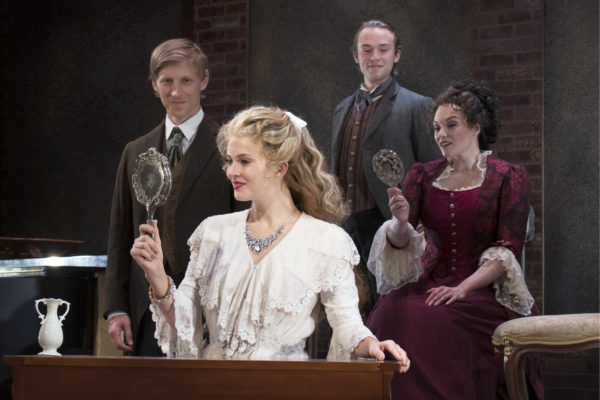Theater Review: “Dumas’ Camille ” — A Thickly Layered, But Intimate, Evening
By Jim Kates
Dumas’ Camille is nothing if not ambitious. Such complexity is seldom found on a summer stage.
Dumas’ Camille written by Charles Morey. Directed by Morey. Staged by the Peterborough Players at 55 Hadley Road, Peterborough, NH, through August 25.

A scene from at the Peterborough Players production of “Dumas’ Camille.” L to R: Jeremy Beck, Rebecca Brinkley, Alex Carr, and Bridget Beirne. Photo: Eric Rothhaus.
Alexandre Dumas ended his 1848 French Romantic novel La Dame aux camélias (translated into English as Camille, a name that hardly appears at all in the play under consideration except in the title) with the sentiment, “the story of Marguerite [Gautier] is unique, I keep saying. If it were not, it would not be worth writing.”
Unique as it is, the story has gone through innumerable transformations, first into a popular play rewritten by Dumas himself, then into Verdi’s grand opera La Traviata, and most recently into Charles Morey’s thickly layered play Dumas’ Camille.
Morey has incorporated earlier narrative and theatrical incarnations of the story into a further fictionalized framework of the imagined real-life affair between a young French writer and the noted Parisian courtesan Marie Duplessis, who was herself the artistic creation known as “the lady with the camelias” of a young woman named Alphonsine Rose Plessis. (The camelias, originally a direct allusion to the lady’s carnality and availability, were softened in their symbolism for a censorious stage.)
“So many different versions of the same truth,” the aged Dumas (Gus Kaikkonen) laments as he looks in on a rehearsal of Verdi’s La Traviata, based on his work. He recalls also his own adaptations of life to page and stage, contemplates his former mistress’s and his own mortality, and comments on how the imagination shapes and reshapes the chaos of actuality into the containment of art.
Does this sound like too much? If the concept sounds complicated, it is, and it is a tribute to both the writing and the production, directed by the author, that the separate elements remain discrete and comprehensible even as they are incorporated into a new whole. Morey as writer and director has fabricated an intricate evening of theater.
At the literal and dramatic heart of the story is Dumas’ imagined Marguerite Gautier (Rebecca Brinkley). She needs to be, in the words of Morey’s Dumas, “a combination of gaiety, sadness, and frank sexuality.” Brinkley manages the sadness beautifully, the gaiety intermittently, but suggests a little too much the “sweet little virgin schoolgirl from Tours” imagined as her opposite, too staccato to be sensual, and hardly at all consumptive. She is upstaged, both in emotion and physicality, by Bridget Beirne’s operatic incarnation of the same character (Violetta Valéry). Admittedly, Beirne has the advantage of glorious music, well sung in aria and in duet with tenor Alex Carr. In general, James Prigmore has made effective use of the Verdi (sensitively integrated by the accompanist Pedro Ka’awaloa) so that it underlines and informs the drama without overwhelming it.
Jeremy Beck plays the young fictional avatars of Dumas with a proper, callow awkwardness that ripens convincingly into genuine love, bitter disillusion, and ultimate fidelity. In his original novel, the young Dumas wrote that, “not having reached the age where a writer can invent characters, I am content just to tell the story.” Beck conveys this sensibility admirably.
His elderly counterpart has a different relationship to the characters and the numerous stories they generate. Kaikkonen functions in the first act of the play primarily as a kind of chorus, Dumas sometimes confounding one level of his own story with another, but Kaikkonen emerges fully into his characterization and understanding in the second act, where the strength of his interpretation almost makes us lose sight of his valedictory decrepitude.
Bright and mercenary, Marguerite’s companion Prudence is sharply delineated by Lucy Zakaitis. Behind her, Tom Frey and Kraig Swartz fill in necessary roles for the plot as Marguerite’s Doctor Koreff and the wealthy Comte de Varville, respectively, as well as doubling in the framework of the opera rehearsal.
Dumas’ Camille is nothing if not ambitious. Such complexity is seldom found on a summer stage, and following it is the reward not only of the playwright-director and his cast, but also of the audience, to whom it comes across clearly and thoughtfully.
Jim Kates is a poet, feature journalist and reviewer, literary translator and the president and co-director of Zephyr Press, a non-profit press that focuses on contemporary works in translation from Russia, Eastern Europe, and Asia. His latest book is Paper-thin Skin (Zephyr Press), a translation of the Kazakhstani poet Aigerim Tazhi.
